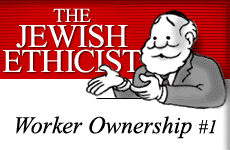 Iran’s Attack on Israel
Iran’s Attack on Israel


4 min read
3 min read
11 min read
5 min read
Should workers have a say?
Q. Is there an ethical dimension to worker ownership?
A. Many countries have laws which encourage companies to introduce some degree of employee ownership. In the US, for instance, employers can obtain tax breaks if they set up an Employee Stock Ownership Plan (ESOP). Spain has a highly-developed network of employee cooperatives, which are also encouraged by various subsidies and tax breaks. This encouragement is based on the conviction that there is a public interest in having more worker ownership. This column will discuss the more general economic basis for this interest; next week we will examine the insights of Jewish tradition for this issue.
The ethical impetus for these arrangements is that the fundamental ethical obstacle to work relations is the divergence of interest, information, and power between management and workers. The owners, represented by the managers, have much to benefit from the good will and cooperation of employees. When employees work hard, innovate, and are forthcoming with information relevant to management, then the company will be more successful. But management also has an interest in ensuring that additional earnings accrue to the company, and are not all appropriated by the workers. Very often they decide that it is worth their while to pass up on the benefits of worker involvement in order to maintain tighter control over workers and moderate pay demands.
Workers, in the meantime, are often interested in increasing their pay even at the expense of the long-term health of the firm or industry. One of the reasons often given for the decline of unions in the United States is not that fewer workers are unionized in traditional union industries, but rather that the presence of unions has itself created a cost barrier which has led to the gradual decline of these industries and the rise of others which are less unionized.
Worker ownership is a promising way of breaking this impasse. When workers are owners, managers are beholden to them, and thus are obligated to consider their concerns. Workers meanwhile are concerned not only about their salaries but also about the value of their ownership interest; thus, they have more of an incentive to agree to participate in or even initiate changes in structure or operations which are to the long-term benefit of the firm. This in turn gives management an additional reason to empower workers: not only do the workers, as owners, demand empowerment; they also can be trusted on to use their power for the benefit of the company since they have a prominent financial interest in the success of the business.
So worker ownership unites left and right. The economic Left has traditionally sought worker democracy, that is, empowering the workers in the workplace; the economic Right has traditionally sought an "ownership society" where individuals have a stake and an interest in business success. Worker ownership has the potential to combine both goals.
Of course, worker ownership is not a panacea. For instance, in firms with a lot of capital compared to the number of workers it's just not realistic for the workers to own a meaningful fraction of company value. The same applies to industries where wages are very low.
Another issue is turnover. One advantage of worker ownership is that it tends to reduce turnover, since the workers are more motivated. But turnover is not all bad, and many industries are naturally suited to short terms of employment. Again, it's not realistic to encourage workers to own a share of the company if they are likely to quit in two or three years. Short-term fluctuations in stock value are likely to be much more significant than any contribution to value due to improved motivation. And enabling employees to cash in their shares when needed can raise difficult questions of valuation, especially if the stock is not widely traded on a stock exchange.
Another important issue is the nature of worker ownership. One approach is purely individual worker ownership, where each employee is encouraged to own a little stock. This approach has the advantage of avoiding compelling workers to belong to some kind of worker collective, such as a union. But this approach doesn't really create a vehicle for workers to make their voice heard collectively. Conversely, creating a committee or the like enhances worker empowerment collectively, but on the individual level makes the worker subject to a committee or union which may not be truly representative.
Worker ownership, such as stock ownership plans, pensions, cooperatives, or options, are not a cure-all for all conflicts of interest between workers and management. But they can be a very valuable tool to create just a little more incentive for management to consider the needs of workers and for employees to enjoy and promote the business success of the firm.
Send your queries about ethics in the workplace to jewishethicist@aish.com
To sponsor a column of the Jewish Ethicist, please click here.
The Jewish Ethicist presents some general principles of Jewish law. For specific questions and direct application, please consult a qualified Rabbi.
The Jewish Ethicist is a joint project of Aish.com and the Business Ethics Center of Jerusalem. To find out more about business ethics and Jewish values for the workplace, visit the JCT Center for Business Ethics website at www.besr.org.
